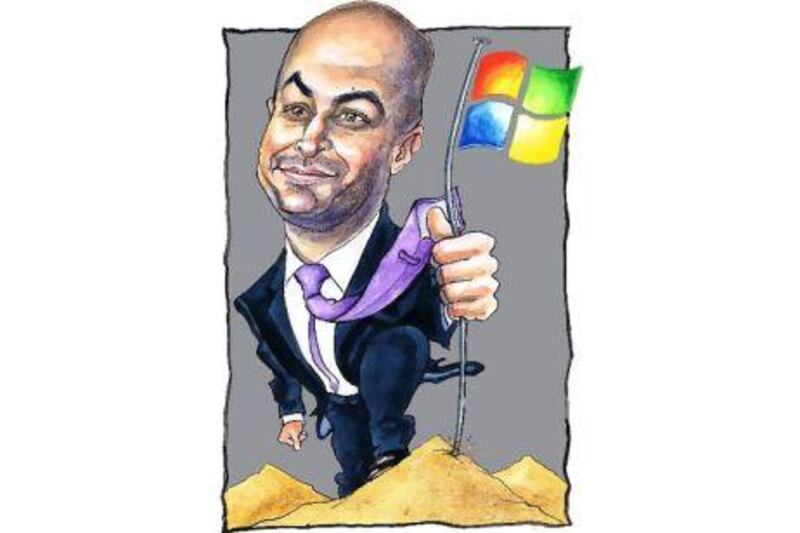Don't let his computer science degree fool you. Samer Ramez Abu-Ltaif's academic training may seem like a cliche technological precursor to becoming the regional general manager for Microsoft Gulf, although little about the executive's background is typical.
Take the four years he spent working on his bachelor of science at the American University of Beirut in the late 1980s. Every day, after class wrapped up, he would rush home before gunfire broke out in the night.
Video: Exclusive video interview: Microsoft Gulf GM on Skype and gaming
July 21, 2011 UAE
Samer Abu Ltaif talks to The National's Neil Parmar on Microsoft’s rise in the gaming industry, and whether Skype may open up in the Emirates.
"This was at the peak of the war in Lebanon," says Mr Abu-Ltaif, who lost a "very, very close" uncle during the civil war.
"I wouldn't claim I had a normal student life in campus," he adds.
Nor was the start of his work life normal. After graduation, he began his career in Kuwait as a marketing representative for the global technology company NCR and spent a few months training in the US.
But soon after his return to Kuwait in 1990, Iraqi forces invaded the country and he found himself again in the middle of war.
"In a way, I felt that I'm cursed," says Mr Abu-Ltaif. "I stayed for two weeks and then I left."
He returned to Kuwait after that conflict, the First Gulf War. Meanwhile, he advanced rapidly in his career, to account manager and then sales manager. At just 29, he was managing the company's business for all of Bahrain.
Part of the key to his success, although he seems careful not to use the word himself, "has to do with the responsibilities I carried as someone who lived in a country of war", he says.
"I think I grew faster than my age, built a lot of resilience [and] took responsibility for a lot of things. I hate to say it, but I owe it to tough circumstances for enabling me to be what I am."
Today, from an office in Dubai, Mr Abu-Ltaif, 44, oversees Microsoft's Gulf subsidiary, which is a small but fast-growing revenue-maker for a corporation that earned more than US$16.4 billion (Dh60.23bn) globally in its latest quarter.
While Microsoft's revenue in the region is not broken down publicly, its regional business has been growing at a double-digit rate in recent years, and the Gulf unit is one of the top subsidiaries within the broader Middle East and North Africa region, says Mr Abu-Ltaif.
"We believe that for every $1 that is spent on Microsoft technology and software here, there are $7 or $8 generated by our partner ecosystem - which is very important for creating a local software economy," he says.
One of the company's biggest boasting points in the Emirates lately has been Kinect, a motion-sensing device for the Xbox 360 video console.
"Because you've had the Kinect launch last year, you've seen the Xbox really take off and more or less go head-to-head with Sony in the Middle East, which was otherwise a PlayStation 3 market," says Ashish Panjabi, the chief operating officer of Jacky's Electronics, which has nineshops in the Emirates. "You've now seen Microsoft actually take some significant market share."
On the day of Kinect's release last year, Mr Abu-Ltaif took one of the units to his brother's home, where the men and their children duked it out in sports-themed video games.
But don't expect to catch Mr Abu-Ltaif on the gaming console in an executive suite. He is easy to find in his Dubai office, where he sits in an open-plan space alongside some of the more than 200 employees he oversees in the Gulf.
"We all operate in open space," he explains, noting that a similar setup is being applied throughout Microsoft's offices.
"I find people, over the time, they build the etiquette of working in an open environment in terms of managing noise and, if you like, distraction," he adds. "Rather than sitting in a corner and not knowing what's happening outside, I feel comfortable, you know, that people have access to me."
Mr Abu-Ltaif has been in his latest role only since November. In a sense, his relatively new gig seems almost a demotion from his previous one as the director of the company's enterprise and partner group in the Middle East and Africa.
In that position, which he held for five years, he oversaw Microsoft's support of businesses in 79 countries with products and services.
The biggest challenge with that role was that there was "no recipe that could come from the corporation that would fit the same way in Turkey and in Saudi Arabia and in Ghana".
"The implementation of initiatives depended on the maturity of these countries," he says. When Mr Abu-Ltaif began that job in 2005, he had been with Microsoft for only 18 months and in charge of operations in just three countries: Kuwait, Bahrain and Qatar.
Yet his more recent position has allowed him to broaden the way Microsoft interacts with consumers across the Gulf - including competitions to foster technological innovation among high school students and empowering women in the field of IT. This year he helped to launch a "Right 2 Learn" initiative with the Besix Foundation of Belgium aimed at teaching basic computer skills to thousands of construction workers in the UAE.
"When you look at all the blue-collar workers, you don't want them to be left behind in terms of digital literacy," he says.
"I feel that the company I work for is enabling people and businesses to realise their potential," says Mr Abu-Ltaif. "It's helping bridge a digital divide in terms of their [access] to technology."





